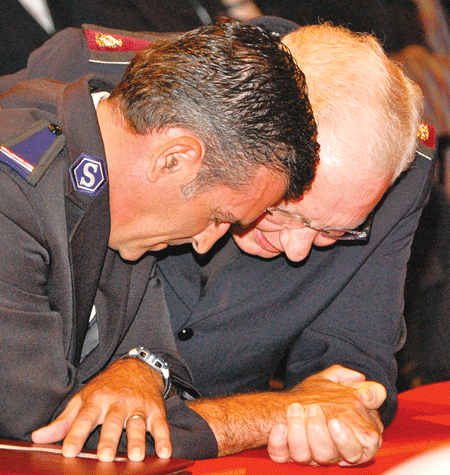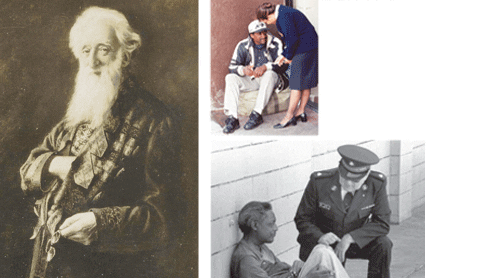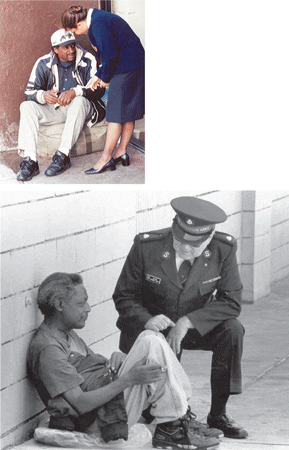Oh…this Army…and its uniforms…and its tambourines…and its…
How did we get to be the way we are?
Explore this with me. I think it has much to say about what we are now.
So, let’s look, first, at some of The Salvation Army’s characteristics taught us from our heritage. Then, we’ll compare and contrast our present characteristics with them.
Loving the poor
Right from our 19th century start, William Booth, The Salvation Army’s founder, articulated its driving focus. “Go for souls, and go for the worst,” he said. He was always concerned about “the submerged tenth” of the population, using that term a century prior to its common usage. The poor, the disenfranchised, and the marginalized were his people. He believed firmly that “poverty was the devil’s weapon.” Therefore, “the poor were his natural congregation,” as Roy Hattersley writes in Blood and Fire. Soup kitchens provided meals in many corps, and Army cots were nearby for the homeless.
Booth seemed unbound by traditional church ministry, and much to the disgust of his fellow pastors, “his style of evangelism was a living reproach to every vicar in whose parish he preached and every minister whose circuit he invaded,” Hattersley wrote. Corps members (soldiers), many who had recently escaped from their destitution, aided their colleagues in finding redemption.
Adaptable means combined with intense spiritual focus
After 1890, the principal goal of the organization could be easily understood by anyone. We had two goals—one specific and one implied. The first was spiritually centered: to save souls in order to redeem individuals and families. We achieved the second, an implied social goal, as a by-product of achieving the first, working to speed the exit from suffering due to poverty. Booth saw social work as a valued by-product.
Booth always used a free-wheeling, flexible approach in the means to accomplish his goals. It was a pragmatic approach to the communication of an inflexible belief system. If one way to the goal didn’t work, he tried something else.
The military characteristic of clear, focused leadership ordering rapid action with effective forces facilitated movement toward goals. One person, the General, could dispatch forces and have them in action at a moment’s notice.
Getting good help
Booth had the best help one could imagine. His family.
Marrying Catherine provided Booth with a helpmate whose contributions to his uninhibited views of religion made the Army much different than it might have been without her. She softened his arrogance, tempered his egoism and led him to embrace views he had once questioned. She had great influence, but expressed it in ways she knew he would hear.
Hattersley notes: “[Catherine’s] greatest triumph concerned the dispute over female ministry. She insisted, with careful reference to the context, that God had intended more for women than the occasional right to preach—itself a scandalous notion. [They feared that] the female ministry would grant women authority over men. Even her husband had initial doubts about her radical view of church governance.”
Slowly, Catherine prevailed in her point of view because of her “undoubted intellectual superiority and passionate belief that men and women were equal in the sight of God.” Her advanced ideas on social equality were highly important in the continuing development of her husband’s thinking. She spoke widely on issues like “Sham Compassion,” and refuted most of the secular efforts to improve the living conditions of the poor as failures and ill advised. Her approach was dual—both spiritual and secular. She saw the method to “elevate the masses” as an obedient willingness of consecrated people to “take up thy cross and follow me.”
On top of all she did, this congenitally ill woman bore eight magnificent, brilliant and highly autonomous children in 11 years. These children and their spouses carried on The Salvation Army’s work with the same fervor and dedication.
Millions of others, imbued with the same sense of compassion, have helped actualize Booth’s dream as the Army spread around the world.
Keep expanding the mission response
According to Hattersley, Booth’s tendencies were expansionistic in terms of developing means to his goal, but reluctant to move prematurely to expand work outside Britain. It didn’t take long, however, for him to be forced to change his mind as a result of the unexpected actions of others, including Eliza Shirley, a young Salvation Army officer in Philadelphia who had opened a corps in a chair factory in 1878; three British émigrés who opened a corps in Adelaide, Australia; and promises of donated buildings and several letters from France urging the Army to open work. All of this kind of volunteer, lay activity pressured London for help and recognition.
Booth responded with alacrity.
A flag waving George Scott Railton led seven Hallelujah lassies down the gangplank of the ship Australia on March 10, 1880 after a four-week voyage from London, as recorded by Diane Winston in Red Hot and Righteous—The Urban Religion of the Salvation Army.
Hattersley writes: “Booth kept it in the family, and thus married his dynastic and territorial ambitions together. He sent his 22-year-old daughter, Kate, to take command of France in 1881.” Within a week, Kate had been arrested twice. It didn’t change her at all. His son, Herbert, went to Australia. Ballington came to the United States. He assigned Evangeline to Canada and then to the U.S.
“By the end of 1882, the Salvation Empire had expanded into five continents,” Hattersley writes. “At a great demonstration in Exeter Hall 100 officers were ‘set apart for service here and abroad.’”
As the Army “invaded” other cultures, its outdoor ministry and passionate proselytizing caused negative reaction from the civil authorities who arrested and punished the offenders. Those punished refused to back down. The cycle seemed to be that of a street demonstration, followed by arrest, followed by refusals to abide by the dictate of authority—dictates often unsupported by law. This slowly brought acceptance, often within limits.
 Attract attention and involve the media
Attract attention and involve the media
The press often ridiculed actions of the Army. Winston writes: “The Army accepted public ribbing because its founder, William Booth, taught them that all publicity was good publicity. The goal, he wrote, was ‘TO ATTRACT ATTENTION.” This method, usually involving outdoor ministry, was perceived as massively inappropriate.
“As always, The Salvation Army reacted to persecution by increasing the activities for which it was being persecuted,” Hattersley writes. Booth replied: “If the people are in danger of the damnation of Hell, and asleep in the danger, awaken them.”
According to Winston, “Leaders were instructed to keep the local city editor informed about corps activities (but never bore him), and never take offense at anything in print.”
Have a plan, work the plan, evaluate the outcomes
In 1890 Catherine succumbed to the ravages of her cancer. Two weeks later Booth published In Darkest England and the Way Out, and with it the dual mission of spiritual and social work. He and Commissioner Frank Smith had been working on it for over a year. Its preface honored Catherine, the one who reminded him continually of the relationship between God and poverty and the inseparable nature of social and spiritual morality.
With this book, social work for Booth became much more than simply a by-product. The book planned the elimination of the world’s poverty and shamed society with the stark comparison of the life of a poor, forgotten man with a London cab horse. Booth wrote that horses had better treatment than the man, and graphically described his views in “The Cab Horse Charter”:
When a cab horse falls, no one faults the creature for being weary or careless or stupid: he is helped to his feet at once for his own sake and to prevent obstruction to traffic. Once back on his feet, he is fed, kept warm and dry at night and given work.
These then are the two points of the Cab Horse Charter. When he is down, he is helped up, and while he lives he has food, shelter and work.
The book stimulated a worldwide social service campaign, often called “The General’s Scheme,” and, undoubtedly gave rise to the Army’s extensive social service work in this country.















this is very helpful to me sociological problem